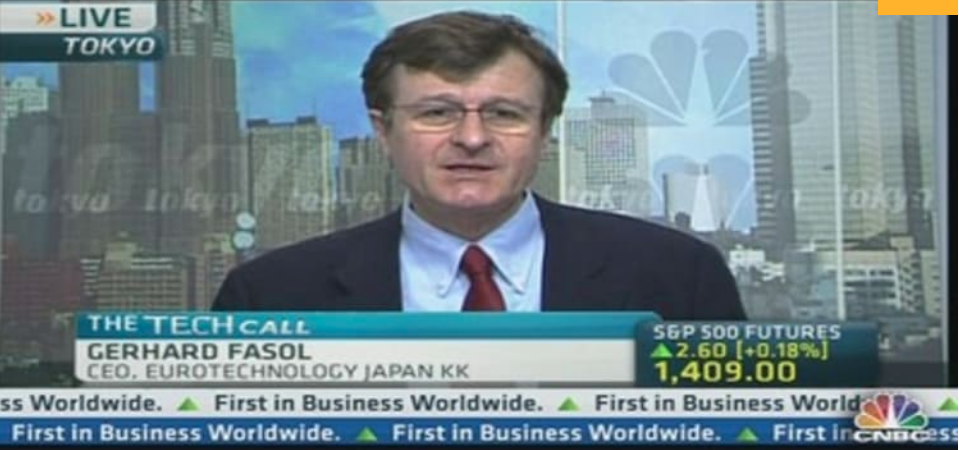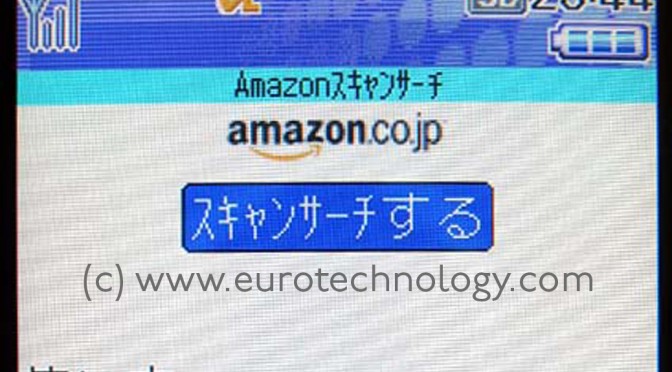https://www.cnbc.com/video/2012/03/27/japans-tech-companies-need-to-restructure.html
Category: Economics
-
Will cash become obsolete?
Gave presentation to the Telecommunications Committee of the American Chamber of Commerce in Japan (ACCJ) on October 7, 2009, entitled “Will cash become obsolete? E-money, mobile payments and mobile commerce”.
Talk was attended by about 30-40 executives from major global telecom operators, global banks, new-age payment companies, and from major internet companies.
Outline:
What is money?
- Medium of exchange
- Unit of account
- Store of value
- (Standard of deferred payment, unit for debt)
e-Cash value to society:
- reduced cash handling costs
- Higher transaction speed
- Convenience
- Greater security (especially mobile) vs. reduced privacy
Why should be care? (Summary)
- Electronic money is here to stay
- One e-money card/Japanese person
- 2% of banknotes and coins today
- YEN 100 billion outstanding
- YEN 100 billion transactions/month
- Japan is far in advance, rest-of-world is likely to follow. But can Japan capture the value? maybe not.
- However: “Galapagos syndrome“
More information in our reports:
Mobile payments, e-money and mobile credit in Japan
SUICA and NFC payment for transport
QR codes are also used for payment -

David E Kuhl and Dennis L. Meadows – winners of the 2009 Japan Prize
David E Kuhl and Dennis L Meadows, the winners of the 2009 Japan Prize gave a presentation in Tokyo on April 22, 2009.
Professor David E Kuhl was given the Japan Prize for tomographic imaging in nuclear medecine, he has been called the “father of emission tomography”, having developed tomographic imaging in nuclear medicine.
Dennis Meadows is famous for his book “The Limits of Growth” (1972), which was written by three MIT scientists including Meadows as a project funded by the Club of Rome. Meadows has shown that current economic and human activity has become unsustainable.
Asked about the current economic crisis, Meadows explains the current economic crisis as the bottom of the Kondratiev cycle, which has a period of 45-60 years (about 50 years). According to Meadows the reason for the Kondratiev cycles is overinvestments in production resources. Excessive production resources need to be adjusted to actual needs periodically, and this period is about 50 years. The last Kondriatiev-type elimination of production overcapacity was caused by the damages of the 2nd World War. Currently this down-adjustment of production resources occurs in peace-time.

David E Kuhl and Dennis L Meadows, the winners of the 2009 Japan Prize in Tokyo on April 22, 2009 More in our J-ELECTRIC report: http://www.eurotechnology.com/store/j_electric/
Copyright· (c) 2013 Eurotechnology Japan KK All Rights Reserved
-
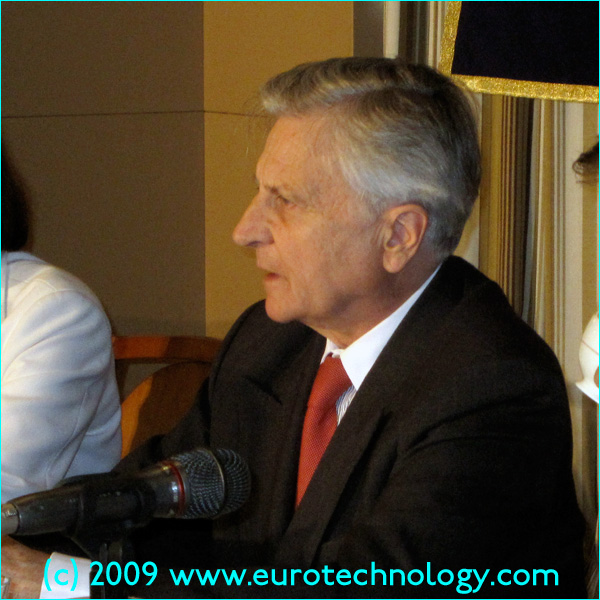
Jean-Claude Trichet, President of the European Central Bank ECB in Tokyo
European Central Bank (ECB) President Jean-Claude Trichet gave a presentation here in Tokyo on April 18, 2009 about the current financial and economic crisis.
Trichet blamed the crisis on an underpricing of the unit of risk. He also emphasized that its not a general crisis affecting all companies and financial institutions, but that some badly managed companies and banks are in bad shape, while well managed companies and financial institutions are in good shape and doing fine.
Trichet praised excellent international cooperation in taking measures to improve economic and financial stability and he also mentioned that unconventional steps will be announced at future meetings.
Overall his words were very carefully chosen and defensive, well aware of the impact of his words on the capital markets

European Central Bank ECB President Jean-Claude Trichet Copyright (c) 2013 Eurotechnology Japan KK All Rights Reserved
-
Investor Club: What crisis? Meet some booming Japanese companies
It’s not all doom and gloom here in Japan. Nintendo’s sales and operating profits are rising 8.8% year-on-year. KDDI saw its net profits increasing 59% year on year. Yahoo Japan increases dividends by 22%-25% for 2008. Who are today’s winners in Japan’s IT industry? Gerhard Fasol will show us how and why some great Japanese companies excel in today’s crisis.
The talk reviews today’s status of Japan’s electrical companies, the telecommunications sector and the internet sector, and introduces seven different companies, which show rapid growth of revenues, operating income and net income despite the crisis. These seven companies we introduce turn the crisis into an opportunity.
Mr Fasol is one of the best specialists of Japan’s IT industry. After 12 years in Japan working for the most prestigious Japanese institutions and companies (the University of Tokyo, NTT, Hitachi…), he founded the strategy and M&A firm Eurotechnology Japan KK in 1996. Mr Fasol has advised some of the greatest companies, including NTT, SIEMENS, Deutsche Telekom, Cubic, Unaxis and about 100 fund managers on strategy for Japan, as well as the President of Germany. He helped a French pharmaceutical company acquire a factory in Japan.
He comments regularly on CNBC on Japan’s tech sector.Schedule: March 24th, 2009 (Tuesday) from 18:30
The conference will be followed by a light cocktail.
Place: French Chamber of Commerce and Industry in Japan, meeting room
Iida bldg 1F, 5-5 Rokubancho, Chiyoda-ku, Tokyo 102-0085
Tel.: 03-3288-9624
Access map: www.ccifj.or.jp
Language: English
Fees: 5.000 yens (to pay in cash at the door)
Payment will be required for cancellations or no-show after this deadline.
Announcement on the website of the French Chamber of Commerce
read a report on the talk here in the monthly newsletter of the French Chamber of Commerce in Japan (in French)Background reading: our J-ELECTRIC report about Japan’s electric companies
and our Eurotechnology Japan BlogCopyright (c) 2013 Eurotechnology Japan KK All Rights Reserved
-
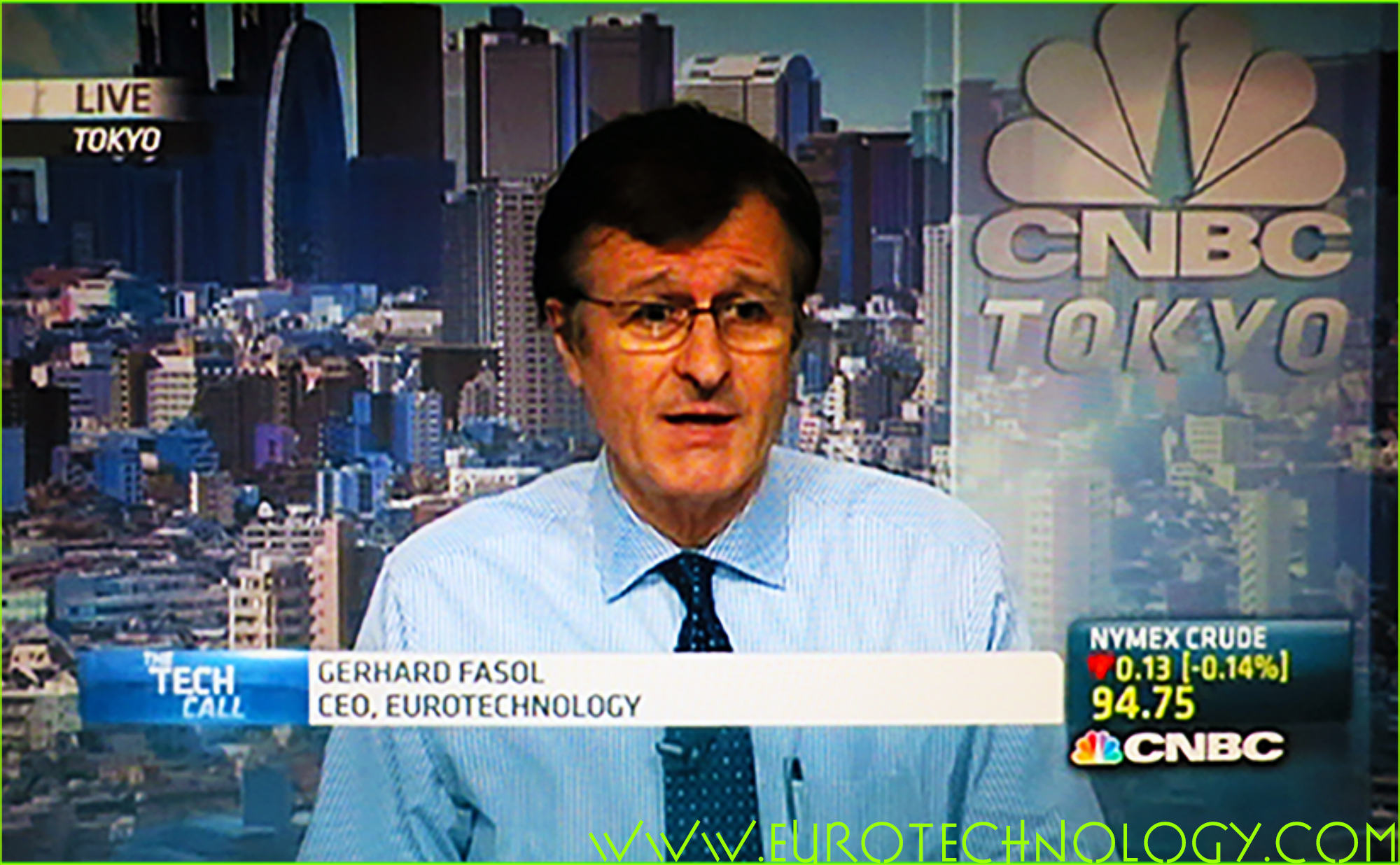
Foggy Outlook for Global Tech Sector (CNBC TV interview)
Foggy Outlook for Global Tech Sector (Airtime: Tues. Feb. 10 2009)
Copyright (c) 2013 Eurotechnology Japan KK All Rights Reserved
-
Japan trends 2008/2009
One of our clients in the financial industry asked me several trend questions:
- Q1: Biggest surprises in Japan in 2008?
- Collapse of Japan’s mobile phone handset market (read our blog). In this context the Japanese telecom equipment makers association invited me to give a presentation, which was booked out 2-3 weeks ahead – about 100 Japanese telecom equipment maker managers attended! The General Affairs Vice-Minister / Secretary of State attended….
- The dramatic increase of acquisitions by Japanese companies:
- Panasonic’s acquisition of SANYO (read analysis in our blog)
- Nomura’s acquisition of a big chunk of Lehman Brothers assets (read about a presentation by Nomura’s CEO Kenichi Watanabe)
- SONY‘s acquisition of the outstanding part of SONY-Bertelsmann music
- TDK‘s acquisition of Germany’s EPCOS
- NTT-Data’s acquisition of Germany’s Cirquent (BMW’s IT company)
- Fujitsu‘s acquisition of the outstanding 1/2 of Fujitsu-Siemens
- Q2: Biggest changes for 2009?
- Hopefully LED/Solid state lighting going mainstream to save energy
- Batteries and solar cells in combination starting to replace petrol for cars
- Solar cell battle (between Q-cells, SHARP and others)
- Q3: Key topics in Japanese media for 2009?
- Financial crisis and reviving the economy
- Crisis of the car industry – and car industry’s paradigm shift
Copyright 2013 Eurotechnology Japan KK All Rights Reserved
- Q1: Biggest surprises in Japan in 2008?
-
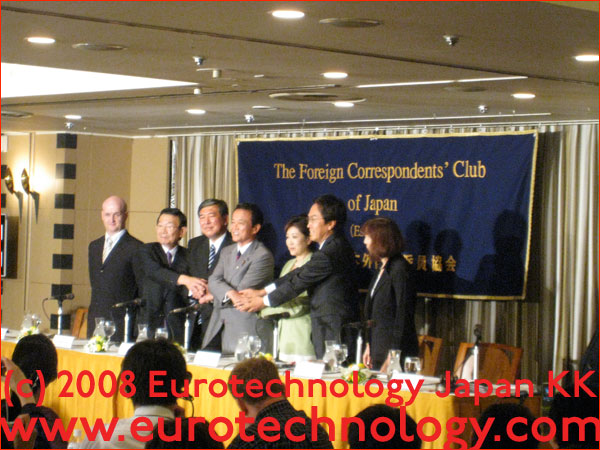
LDP President (and candidates for the next Prime Minister) present their messages
The candidates for the next President of the LDP (Liberal Democratic Party) of Japan presented their views and answered questions at the FCCJ in Tokyo to the foreign press. An LDP party electoral college (387 Diet members + 141 regional representatives, in total 528 votes) will vote to select the president on September 22, 2008, who is likely to become the next Prime Minister after Yasuo Fukuda’s resignation. The candidates are:
- Nobuteru Ishihara (50), son of Governor Ishihara of Tokyo. Minister for Administrative and Regulatory Reform
- Yuriko Koike (56), Journalist, Minister of Defence under Prime-Minister Abe
- Taro Aso (67), Minister of Foreign Affairs und Prime Ministers Shinzo Abe and Junichiro Koizumi. Taro Aso is Roman Catholic. Studied at Stanford University and at the London School of Economics.
- Shigeru Ishiba (51), Minister of Defence under Prime Minister Fukuda
- Kaoru Yosano (70), currently State Minister for Economic and Fiscal Policy
Our comment:
Media generally predict that Taro Aso is likely to win the race for Presidency of the LDP and thus become next Prime Minister of Japan. Taro Aso comes from a leading family, and has wide experience.
Having attended the event at the Correspondents Club, in my opinion Mme Koike gave the clearest presentation – having worked as TV journalist clearly helps, but its also the content of her political program which is clear and meaningful and easy to understand. Mme Koike’s program included the plan to “destroy Kasumigaseki”, meaning that she plans to take political power from the Ministries to the Government and strengthen political leadership…There is a generation gap between Aso (67) and Yosano (70) – and – Ishihara (50), Koike (56) and Ishiba (51). The presentations also clearly manifested this generation gap.
In my opinion Japan would benefit from diversity in leadership. Japan already has a number of outstanding women leaders, and would benefit to have some more women in politics as well, including top positions. So if I could vote – which I can’t – I would myself vote for Ms Koike, and I said so in a TV interview by Asahi-TV.
Nobuteru Ishihara (50), son of Governor Ishihara of Tokyo. Minister for Administrative and Regulatory Reform Yuriko Koike (56), Journalist, Minister of Defence under Prime-Minister Abe Taro Aso (67), Minister of Foreign Affairs und Prime Ministers Shinzo Abe and Junichiro Koizumi. Taro Aso is Roman Catholic. Studied at Stanford University and at the London School of Economics. Shigeru Ishiba (51), Minister of Defence under Prime Minister Fukuda Kaoru Yosano (70), currently State Minister for Economic and Fiscal Policy 
Nobuteru Ishihara (50), son of Governor Ishihara of Tokyo. Minister for Administrative and Regulatory Reform Yuriko Koike (56), Journalist, Minister of Defence under Prime-Minister Abe Taro Aso (67), Minister of Foreign Affairs und Prime Ministers Shinzo Abe and Junichiro Koizumi. Taro Aso is Roman Catholic. Studied at Stanford University and at the London School of Economics. Shigeru Ishiba (51), Minister of Defence under Prime Minister Fukuda Kaoru Yosano (70), currently State Minister for Economic and Fiscal Policy 
Nobuteru Ishihara (50), son of Governor Ishihara of Tokyo. Minister for Administrative and Regulatory Reform Yuriko Koike (56), Journalist, Minister of Defence under Prime-Minister Abe Taro Aso (67), Minister of Foreign Affairs und Prime Ministers Shinzo Abe and Junichiro Koizumi. Taro Aso is Roman Catholic. Studied at Stanford University and at the London School of Economics. Shigeru Ishiba (51), Minister of Defence under Prime Minister Fukuda Kaoru Yosano (70), currently State Minister for Economic and Fiscal Policy Copyright 2013 Eurotechnology Japan KK All Rights Reserved
-

50 years EU celebration in Tokyo
Today was the 50th anniversary of the treaty of Rome which was at the beginning of the European Union. In Tokyo we had a big party at the top of Roppongi Hills – 52nd floor. Here are some pictures…

50 years EU celebration in Tokyo 
50 years EU celebration in Tokyo 
50 years EU celebration in Tokyo Copyright (c) 2013 Eurotechnology Japan KK All Rights Reserved
-

Outsourcing Japan market research and strategy consulting to India, Philippines?? – a recipe for business failure in Japan?
Business decisions unrelated to market realities are a prime reason for failure of foreign companies in Japan
In a quest to reduce market research costs, Japan market research is often outsourced to India, Philippines, Indonesia etc
With shock and surprise we recently found out that a very famous telecom and IT industry market research and strategy consulting firm with a globally famous brand apparently outsources market research of Japan’s mobile phone and telecom sector to India. The Indian employees apparently are diligently studying the Japanese language in evening classes, so that in a few years time, they will be able to read a little of the Japanese mobile market information which can be found on the internet, we assume.
We believe that this explains why so much information about Japan’s telecom and mobile phone markets circulating outside Japan is incomplete, or in many cases even wrong. As a consequence companies like Vodafone then take management decisions in Japan, which were totally unrelated to Japan’s market realities.
This fact also contributes we believe to the fact, that some of the most famous global companies in the telecommunications sector find it so difficult to succeed in Japan – not that Vodafone, Nokia (mobile phones and VERTU – except networks which are a great success), Cable & Wireless, Deutsche Telekom all withdrew from Japan – outsourcing market intelligence to low-cost countries such as China, India, Philippines etc. is certainly one of the contributing factors.
Indeed similar to Vodafone’s departure from Japan, famous global telecom consultancies have also closed shop in Japan, due to the very high costs and the continuous high investments necessary to achieve and maintain leadership in understanding Japan’s telecommunication markets.
We can assure our newsletter subscribers and our customers that our original Eurotechnology market reports and our strategy consulting is hand crafted in Tokyo/Japan. Our team members working on Japan market research and strategy consulting, all live in Japan, are mostly Japanese, and work daily with Japanese CEOs, telecom managers, and most importantly of all, daily interview and discuss with real-life Japanese mobile phones users: face-to-face here in Japan – not across one or more oceans.
Made in Japan: the Original “Eurotechnology” Japan-market reports
Copyright (c) 2013 Eurotechnology Japan KK All Rights Reserved
-
Panel Discussion to 200 Japanese Executives at the Industrial Club of Japan
May 30, 2006: at the Industrial Club of Japan
Panel discussion for about 200 Japanese CEOs and high level managers about the challenges of international business management.
The five panelists were:
- James C Abbeglen
Allen Miner (CEO of Sunbridge Venture Habitat, and founder of Oracle Japan) - Kong Jian (China – Japan Economic Federation)
- Koshiro Kitazato (Chairman of BT Japan)
- Gerhard Fasol (CEO Eurotechnology Japan KK)

Industrial Club of Japan Copyright·©2013 ·Eurotechnology Japan KK·All Rights Reserved·
- James C Abbeglen
-
30 Swedish Controllers / CFO’s
by Gerhard Fasol
April 24, 2006 was my Swedish Day: for breakfast I was invited to IKEA’s opening party for their new store in Funabashi (I met even with the global Chairman of IKEA – that he attended the opening in Funabashi shows how seriously IKEA is taking this (second) market entry to Japan) – we had done some IT work for IKEA.
Lunch and afternoon I spent with about 30 Swedish CFO’s / controllers of some of the largest Swedish corporations, who had come to Japan on a study tour. These CFO’s/Controllers were all working at companies in Investor AB’s portfolio, and the program was organized by Investor AB’s Corporate Academy Novare.
The Swedish controllers had asked for a briefing on Japan’s telecom industry. Some of their companies are considering to start, re-start, or grow faster in Japan, so there were many detailed questions about business in Japan, what can go wrong, personell issues, experience of other multinationals, and of course a lot of questions about IKEA and Vodafone.
My presentation was similar to the presentation I had given on March 23, 2006 to the Technology Attaches of the Embassies of the 25 European Union countries, which lead the European Union to award our company a project contract about EU vs Japan benchmarking issues in telecoms and key technology areas.
Copyright 1997-2013 Eurotechnology Japan KK All Rights Reserved
-

EU Government contract awarded: benchmarking broadband in EU vs Japan
As a consequence of our CEO’s briefing entitled “Why Japan is several years ahead of Europe in telecommunications and what Europe can do to catch up” on March 23, 2006 for the Technology Attaches of the Embassies of the 25 European Union countries here in Tokyo our company has been awarded a project contract by the Government of the European Union to examine EU vs Japan benchmarking issues in telecommunications and related key technology areas.
Read an updated report of Japan’s broadband market, ADSL and FTTH here: Eurotechnology Japan Report on Japan’s telecom sector.
Copyright·©1997-2013 ·Eurotechnology Japan KK·All Rights Reserved·
-
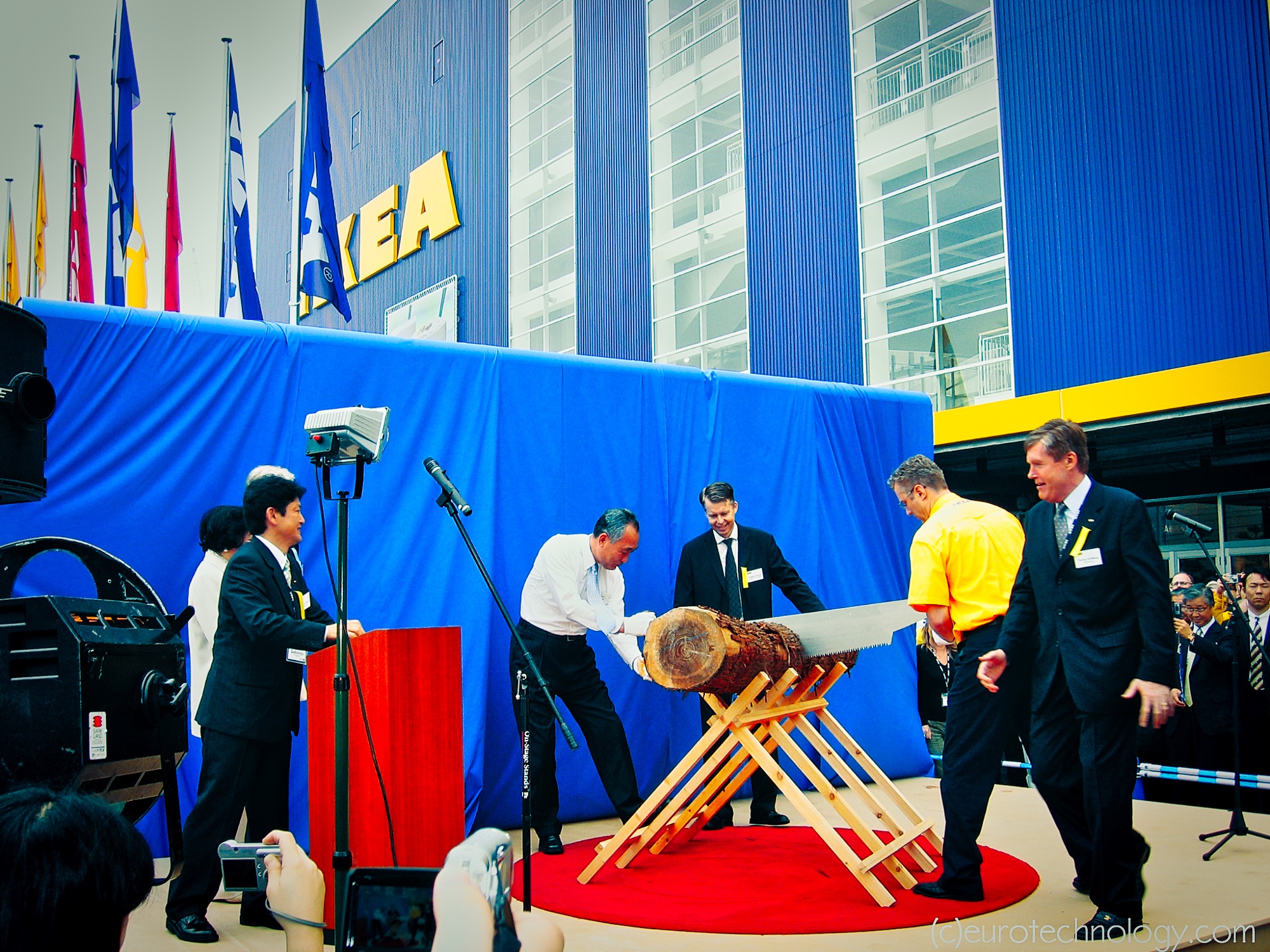
Ikea reenters Japan after 32 years: IKEA’s first try to enter Japan in 1974 failed for IKEA. Now second try in 2006 – a full 32 years later
IKEA enters Japan for the second time, 32 years after the first entry to Japan.
Ikea reenters Japan: IKEA created a joint venture in Japan in 1974 and abandoned it in 1986 – this company still flourishes, but IKEA withdrew from Japan…
Ikea reenters Japan: Today, Monday April 24, 2006 at 7:30am, IKEA invited about 300 guests to celebrate the opening of the first 100% IKEA-owned IKEA store in Japan. We had the honor of working for IKEA – IKEA is another company that “thinks different” in so many creative ways. We wish them all the best in Japan!
IKEA failed the first entry into Japan in 1974 – but the business JV IKEA created was a success!
IKEA had attempted earlier to establish business in Japan via a joint-venture established in 1974. This Joint-Venture was terminated in 1986, and IKEA ended business in Japan in 1986. Interestingly – and this is not the only such case – its only that IKEA itself at that time failed in Japan. The business IKEA created in this joint-venture actually continued successfully without IKEA even after IKEA had left Japan.
There are several cases where foreign companies withdraw from Japan, while the know-how they created in Japan with a joint-venture survives and thrives in Japan under Japanese ownership.
IKEA enters Japan a second time
Ikea reenters Japan: About 20 years later, this is now IKEA’s second venture into Japan.
The photographs shows Mr Koshichi Fujishiro, the Mayor of the City of Funabashi, and Mr Gordon Gustavsson, Manager of the new IKEA Funabashi store sawing the traditional log. Witnessing the log sawing ceremony are Ms Akiko Domoto, Governor of the Chiba Prefecture, His Excellency, Mikael Lindstrom, the Ambassador of Sweden, Anders Dahlvig, CEO of the global IKEA Group and Tommy Kullberg, CEO of IKEA-Japan:

The photographs shows Mr Koshichi Fujishiro, the Mayor of the City of Funabashi, and Mr Gordon Gustavsson, Manager of the new IKEA Funabashi store sawing the traditional log. Witnessing the log sawing ceremony are Ms Akiko Domoto, Governor of the Chiba Prefecture, His Excellency, Mikael Lindstrom, the Ambassador of Sweden, Anders Dahlvig, CEO of the global IKEA Group and Tommy Kullberg, CEO of IKEA-Japan: 
Ikea reenters Japan: IKEA opening ceremony for the IKEA store in Funabashi (c) eurotechnology.com 
Ikea reenters Japan: Opening ceremony of the IKEA store in Funabashi: the Mayor of Funabashi and the IKEA store manager saw a log A JR-Keiyo Line train with IKEA logos passing the new IKEA store in Minami-Funabashi:

A JR-Keiyo Line train with IKEA logos passing the new IKEA store in Minami-Funabashi: Copyright (c) 1997-2024 Eurotechnology Japan KK All Rights Reserved
-

Why are keitai so hot in Japan?
Innovations in Japan’s mobile phone sector
Why is Japan’s telecommunications sector leading?
Seminar announcement
The European Institute of Japanese Studies (EIJS Academy in Tokyo) of the Stockholm School of Economics will hold a seminar in Tokyo-Marunochi on Thursday, February 16, 2006:
Topic: “Why are Mobile Phones (Keitai) so hot in Japan? – and How European companies in all sectors can profit from Keitai”
Speaker: Gerhard Fasol

Gerhard Fasol “Why are keitai so hot in Japan?” Embassy of Sweden Agenda:
Japan created the most passionate and most advanced mobile communications (keitai) market in the world. Recently, almost all innovations in mobile communications have been developed or brought to market first in Japan. Fasol’s talk will explain why this is, and how European companies in all fields, from retail to publishing can profit by building keitais into their business models.
Date: Thursday, February 16, 2006
Time:6.15 – 7.00 p.m. Drink and Snack (served before the lecture)
7.00 – 9.00 p.m. Lecture and Discussion
Place:
Marubiru Conference Square, Room 2 (Tel: 03-3217-7111)
8th floor of Marubiru, 2-4-1 Marunouchi, Chiyoda-ku, Tokyo
One-minute walk from JR Tokyo Station, Marunouchi South ExitFee: JPY2,000 per person, payable at the door
Free for students, please bring your student ID
Free for those who are from sponsoring companiesAdvance registration required: Please sign up (via email) or fax to (FAX 03-3212-1530) for the attention of Ms. Futagawa (EIJS Tokyo Office.)
Japan telecommunications industry report
Copyright 2013 Eurotechnology Japan KK All Rights Reserved
-

Briefing the President of Germany, Horst Köhler: Japan is a technology super power full of creativity and power to innovate
Japan technology briefing for the President of Germany, Horst Köhler
Japan is a technology super power full of creativity and power to innovate
Tokyo, April 3, 2005
Briefing given to the President of Germany, Horst Koehler, and his wife, by Gerhard Fasol in the German Embassy, Tokyo, on April 3, 2005, at the beginning of the President’s official visit to Japan to open the “German Year in Japan”. Accompanying President Horst Koehler were 20-30 leaders of Germany, including Members of Parliament, the President of the German Federation of Industry – the German Ambassador to Japan was chairing the meeting.
1 Excellency, Dear President: Japan is a technology super power
Japan is a technology super power, with strong creativity and power to innovate. I would like to illustrate this fact with a few examples, how innovation in Japan creates new industry sectors and new employment, I would like to describe some consequences for Germany and for Europe, and express some recommendations.
- Many inventions, which change the world and which create employment, come from Japan. I would like mention two examples here:
- Gallium-Nitride light emitting diodes replace light bulbs and fluorescent tubes for illumination and displays
- The mobile internet changes our life, started in Japan and it’s development is most advanced in Japan
- There are many more technology breakthroughs and inventions from Japan, for example carbon nano-tubes or electronic money
- Interaction with Japan enforced total restructuring of leading US companies, including INTEL and MOTOROLA. According to my knowledge, there are almost no European companies yet which were forced to totally restructure their business due to interaction with Japan. I feel that this may happen in the future.
- Was does this mean for Germany and Europe?
- In Japan, as everywhere else, innovation is driven by individual ‘heroes’— not by industry associations or government: Europe should even more than today empoyer individuals
- One way to empower creative European ‘heroes’ is for Europe to introduce as quickly as possible a single, cheap and efficient European Patent
- Technology cooperation is not an aim in itself, but it should achieve well defined and measurable targets
2 Gallium-Nitride light emitting diodes (blue LEDs) are changing the illumination industry and our lives
Thomas Alva Edison invented light bulbs in 1879 (US Patent No. 223, 898). Glass tubes in radio and television receivers have been replaced a long time ago by semiconductors. Semiconductors use far less energy, have a longer operational lifetime, and are much more friendly to the environment.
About 15 years ago, Shuji Nakamura invented the technologies[1] to replace light bulbs and fluorescent tubes by semiconductors, in same way as this has happened in radios and television receivers a long time ago. Shuji Nakamura invented these technology in a small company, Nichia Kagaku Kougiyou, located in Anan, about two hours by airplane from Tokyo. He achieved these breakthrough inventions essentially on his own and with great personal sacrifice.
3 Japan is pioneering the mobile internet
- Today the mobile internet is a major component of the economy of Japan
- While “third generation” (3G, UMTS) mobile communication systems with 384 kbps data transfer rates is being introduced this year in Europe after many delays, mobile internet deployed nationwide in Japan since 2003 by the Japanese company KDDI already has six times higher speed (2.4 Mbps = 2400 kbps) since several years ago. This higher speed enables for example the transmission of full music works, which is not yet practical in Europe, and contributes to the development of new industries in Japan, which cannot yet thrive in Europe, because the infrastructure is not yet in place in Europe.
- Mobile music is revolutionizing the music industry. Already today about 20% of music sales is via the mobile internet.
- Mobile books revolutionize our literary culture. During January 2005 alone, KDDI/AU (Japan’s second largest mobile operator) sold 50,000 electronic books on the mobile internet.
- Why was the mobile internet developed in Japan and not in Europe? A determining factor is research and development: NTT does considerably more research and development than European telecommunications companies. Therefore, already in 1997, Japan had a national packet switched mobile data network, many years before Europe introduced GPRS (Europe’s first version of a packet switched mobile data network).
- Japan’s mobile internet was enabled by a small number of heroic pioneers: I would like to emphasize the work by a Japanese woman—Matsunaga Mari. The mobile internet in Europe also owes much to her genius.
4 Interaction with Japan changes technology industries
Japan’s technology industries some years ago caused US electronics companies including INTEL and MOTOROLA to restructure totally. Could the German automobile industry expect similar interactions with Japan?
What is the significance for Germany? Technologies and business models are globally valid. Therefore Japanese innovations, such as light emitting diodes or mobile phones unavoidably reach Germany. Interaction with Japan have forced leading US corporations including INTEL and MOTOROLA to totally restructure: INTEL switched it’s entire business from memory chips to CPUs because of Japanese competition. With increasing interaction between Japan and Germany, I expect similar impact by Japan on Germany in the future.
As an example, I would like to mention the automobile industry sector. Toyota’s market capitalization is US$ 122 Billion, while DaimlerChrysler’s is around US$ 45 Billion, almost three times smaller. It is therefore obvious that Toyota by increasing business activities in Europe, can have major impact on the largest European car companies. Similar factor three ratios exist between the valuations of Honda and Volkswagen, Nissan and BMW: Honda as well as Nissan enjoy about three times higher valuations by the international investment community than Volkswagen and BMW. I recommend therefore European companies not to neglect Japan.
As an example, we are at present preparing project work with a US company, which will invest about US$ 2 Billion globally this year in new production—100% of this high-technology production investment will be in Japan.
5 Empower individual inventors and engineers: The European Patent
Researchers and companies in Japan and the USA have a great home advantage compared to European researchers and companies, because Japan and the USA have a simple and cost efficient patent system. The table below, taken from an official EU-Website[2] shows that obtaining patent protection for Europe is much more complicated and much more expensive than for USA and Japan. In actual fact, the real situation is even more dramatic than the official table from the EU website shows: in real life, US patents are obtained much cheaper than shown in this table, and obtaining patent coverage for all European countries is much more expensive than the case of 8 countries shown in the table, which only gives protection in a minority of European countries.
A cost efficient and simple European Patent is necessary to correct this European home-disadvantage
6 Why technology cooperation?
An eminent US committee of experts some time ago examined technology cooperation with Japan and optimization with respect to US interests. This committee concluded that technology cooperation is not an aim in itself, but there should be measurable targets. The committee found that a suitable target is the creation of highly paid employment in the USA.
I would recommend, that in case increased technology cooperation with Japan is discussed during the German Year in Japan, that in the same way as the USA did, also Germany examines technology cooperation with Japan overall, and orients technology cooperation towards measurable targets. I can well imagine that creation of highly paid employment in Germany could also be a good way to measure the value of individual cooperation projects.
7 My recommendations for Germany and Europe:
- In Japan as anywhere else, innovation and break throughs are driven by single individuals, not by institutions or government authorities. Therefore: empower individual researchers and developers and engineers
- A user friendly, quick, simple and cost efficient European Patent should be introduced to remove Europe’s handicap for research and innovation compared to US and Japan
- For many German companies the best strategy is not China or Japan, but: China and Japan
- For many US companies Japan is the largest and most important foreign market. For a long time, Japan has been neglected in Germany. Business with Japan creates jobs in Germany.
- Technology cooperation with Japan is not an aim in itself. There must be a measurable target. An eminent US committee examined this question, and reached the conclusion that technology cooperation with Japan should create highly paid employment in the USA. I recommend that German technology cooperation with Japan should also be targeted to achieve a desirable target, such as the creation of highly paid employment in Germany.
Japan technology – References
- Shuji Nakamura, Gerhard Fasol, Stephen J. Pearton, ‘The Blue Laser Diode: The Complete Story’, Springer Verlag (Heidelberg, 2nd Edition, October 2, 2000), ISBN: 3540665056
- http://europa.eu.int/comm/internal−market/en/indprop/patent/2k-41.htm
- Gerhard Fasol, ‘New Opportunities versus old Mistakes: foreign companies in Japan’s high-tech world’, presentation at Stanford University, (Oct 28, 1999)
Copyright notice: photograph of the The President of Germany Horst Köhler is public domain, see Wikipedia here.
Download Gerhard Fasol’s presentation to German President Horst Koehler
If you need the German original or the English translation of Gerhard Fasol’s presentation to German President Horst Koehler please contact us
Copyright 1996-2019 Eurotechnology Japan KK All Rights Reserved
- Many inventions, which change the world and which create employment, come from Japan. I would like mention two examples here:
-
Creating a Mission Statement for a Top Ranking Japanese Engineering University and Suggestions for its Realization
“Creating a Mission Statement for a Top Ranking Japanese Engineering University and Suggestions for its Realization”
Presentation by Gerhard Fasol at the “International Symposium on Building Global Excellence in Engineering Education”
“International Symposium on Building Global Excellence in Engineering Education”
Japanese programTokyo Institute of Technology, Tokyo, Japan, Wednesday, September 3rd, 2003: 11:50-12:35
Copyright·©1997-2013 ·Eurotechnology Japan KK·All Rights Reserved·
-
Briefing about Japan’s high-technology business world for Mme Nicole Fontaine
Briefing about Japan’s high-technology business sector for Mme Nicole Fontaine, Vice-Minister for Industry of France
Tokyo, Friday, September 20, 2002, at the French Chamber of Commerce and Industry in Japan.
Copyright·©1997-2013 ·Eurotechnology Japan KK·All Rights Reserved·
-
M-Commerce in Japan
Presentation given by Gerhard Fasol, to the Asia/Pacific – Midwest Business Conference
Panel Presentation “E-commerce in Asia”, on Wednesday April 10, 2002, 8:00-9:30am, organized by the US Department of Commerce and the Illinois District Export Council.Copyright (c) 1997-2013 Eurotechnology Japan KK All Rights Reserved
-
New opportunities versus old mistakes: Foreign companies in Japan’s high-tech markets
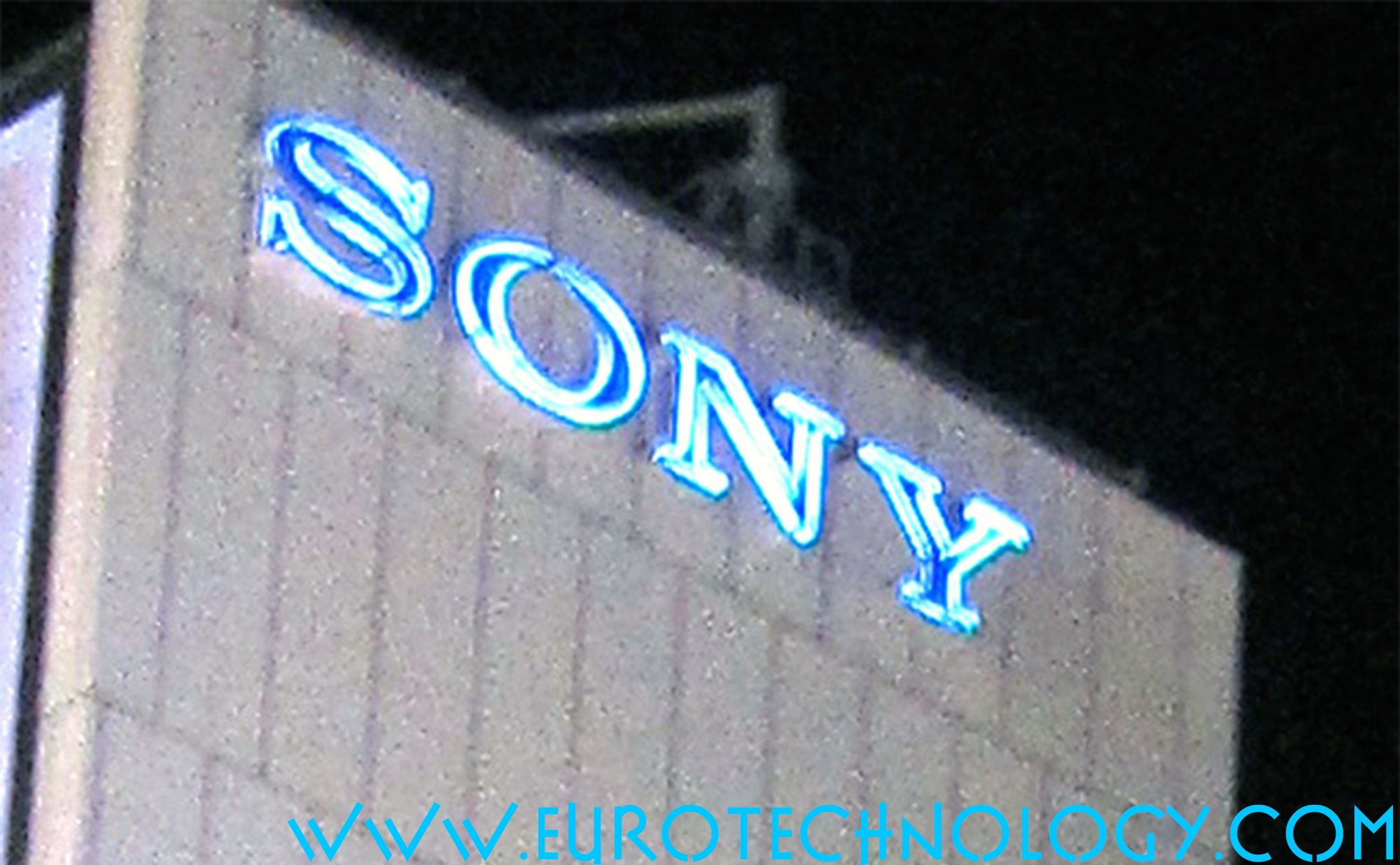
Masaru Ibuka, Founder of SONY, Obituary for NATURE
Masaru Ibuka obituary in NATURE by Gerhard Fasol
After Masaru Ibuka (井深大) died on December 19, 1997, NATURE asked me to write an obituary about Masaru Ibuka, which was published in Nature on February 26, 1998, and you can download the article as a pdf-file here. The reference is: Gerhard Fasol, “Obituary: Masaru Ibuka (1908-97)”, Nature 391, p. 848 (26 February 1998).
Masaru Ibuka obituary in NATURE by Gerhard Fasol – the background
I used several weeks of my spare time to research and write this obituary. For example, I worked to reach and talk with several people who had met Ibuka in person, since I had never personally met Ibuka. As another example: General McArthur’s Government of Japan wanted to communicate with the population of Japan via radio, however, radio receiver production in Japan was very inefficient at that time due to quality problems, leading to very low yield. So General McArthur’s Government brought Quality experts Homer Sarasohn and Charles Protzmann to Japan to teach classes in quality management. I found out that Ibuka was a keen student of these quality classes. To understand this better, I phoned with a retired officer of General McArthur’s Government, and I also found relatives of Homer Sarasohn, who very kindly gave me a lot of information about Homer Sarasohn’s work in teaching quality management in Japan.
Debunking some myths about SONY and Masaru Ibuka
Interestingly, there is a lot of misunderstandings and myths around SONY, some of which I clarified in the Nature obituary for Masaru Ibuka.
Myth: Akio Morita is the founder of SONY
Reality: SONY was founded as Tokyo Tsushin Kenkyusho (the Tokyo Communications Laboratory) by Masaru Ibuka and by Akio Morita, who are the two co-founders of Tokyo Tsushin Kenkyusho, the company name was later changed to SONY.
Myth in Japan: Many people in Japan think that SONY is an American company
Reality: SONY is a Japanese company with headquarters in Tokyo-Shinagawa. The reason why many people think that SONY is an American company, is that SONY’s company name and brand name in Japan is written in Katakana, while traditional Japanese companies always write their company in Chinese characters (Kanji). (Note however, that Nissan President Carlos Ghosn, says that companies have no nationality).
Myth: Nobel Prize winner Leo Esaki discovered the tunnel diode, for which he was awarded the Nobel Prize, at IBM
Reality: Leo Esaki discovered the tunnel diode as a researcher at Tokyo Tsushin Kenkyusho, which later changed the company name to SONY. Leo Esaki then moved to IBM Yorktown Heights R&D labs, and was awarded the Nobel Prize while working at IBM for his discovery of the tunnel diode, which he discovered while working at Tokyo Tsushin Kenkyusho.
Read more about today’s SONY:
Copyright (c) 1996-2014 Eurotechnology Japan KK All Rights Reserved
